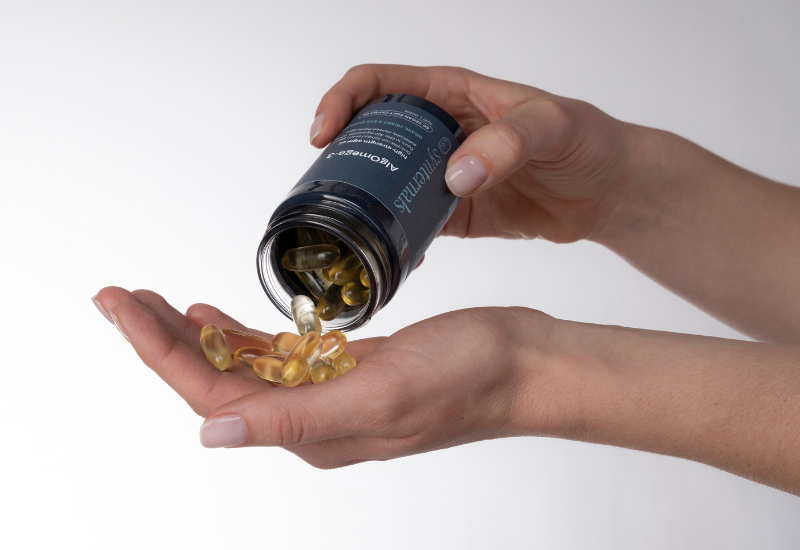- 0086-571-85302990
- sales@greenskybio.com
Algae Oil vs. Fish Oil: Omega-3 Sources Compared
2025-06-16

Algae oil and fish oil are both rich sources of heart-healthy omega-3 fatty acids, but they are derived from different origins. Algae oil is a vegan and vegetarian-friendly option sourced from microalgae, while fish oil is extracted from fatty fish such as salmon, mackerel, and tuna.
Comparing Algae Oil and Fish Oil
Source:
- Algae oil comes from microscopic algae, providing a plant-based omega-3 option.
- Fish oil originates from various ocean fish.
Fatty Acid Content:
- Algae oil typically offers 100 to 300 mg of DHA (docosahexaenoic acid) per serving and variable amounts of EPA (eicosapentaenoic acid).
- Fish oil usually provides about 120 mg of DHA and 180 mg of EPA per serving.
Available Forms:
- Both oils are sold in capsules, tablets, softgels, and liquid oils. Algae oil is also available as powders and emulsions used in fortified foods.
Cost and Sustainability:
- Algae oil is more expensive, but it is considered more sustainable since algae are easily cultivated, and fish stocks are increasingly strained by demand for fish oil.
- Fish oil is generally less costly but may have a stronger taste or smell, which some consumers dislike.
Key Health Benefits
Both algae oil and fish oil are high in omega-3 polyunsaturated fatty acids (PUFAs), which have been linked to a variety of health benefits:
- Anti-inflammatory properties
- Support for heart and brain health
- Enhanced vision and cognitive development
- Support for mental well-being
Research shows that the health effects of both oils are quite similar because both provide essential omega-3s. Algae oil, featured in many infant formulas in the United States, offers comparable levels of DHA to breast milk, supporting brain and vision development in infants.
Algae oil may also:
- Improve cholesterol levels by lowering triglycerides and raising good (HDL) cholesterol
- Support cognitive function, especially in those with early signs of dementia
- Reduce inflammation, as shown in studies on human immune cells
Risks and Precautions
DHA and EPA from algae oil are considered safe by the FDA in doses up to 3 grams per day. However, excessive intake—over 2 grams daily—can increase the risk of bleeding or atrial fibrillation, particularly in individuals with heart conditions. Common side effects of algae oil supplements include headaches and digestive symptoms such as nausea, diarrhea, or stomach discomfort. Algae oil may also interact with blood thinners like warfarin, making careful medical supervision important in these cases.
Recommended Dosage
Algae oil supplements usually contain 100 to 300 mg of DHA per serving, and some products include EPA. Recommendations for omega-3 intake range from 200 to 1,000 mg of DHA and EPA daily, depending on health goals:
- For heart protection, the American Heart Association (AHA) recommends 1,000 mg of DHA and EPA combined per day.
- To lower triglycerides, the AHA suggests higher daily doses—2,000 to 4,000 mg.
- Doses above 1,000 mg can increase the risk of atrial fibrillation in susceptible individuals.
Total omega-3 intake should account for both supplements and dietary sources like oily fish. For example, a single 3-ounce portion of salmon provides nearly 2 grams of DHA and EPA.
Choosing a Quality Supplement
Dietary supplements are not tightly regulated in the U.S. It’s important to select products that have been independently tested or certified by trusted organizations such as NSF International, U.S. Pharmacopeia (USP), or ConsumerLab.com. For personalized advice on selecting the right omega-3 supplement and dosage, consult a healthcare provider, registered dietitian, or pharmacist.
- ▶ Hesperidin
- ▶ Citrus Bioflavonoids
- ▶ Plant Extract
- ▶ lycopene
- ▶ Diosmin
- ▶ Grape seed extract
- ▶ Sea buckthorn Juice Powder
- ▶ Fruit Juice Powder
- ▶ Hops Extract
- ▶ Artichoke Extract
- ▶ Mushroom extract
- ▶ Astaxanthin
- ▶ Green Tea Extract
- ▶ Curcumin
- ▶ Horse Chestnut Extract
- ▶ Other Product
- ▶ Boswellia Serrata Extract
- ▶ Resveratrol
- ▶ Marigold Extract
- ▶ Grape Leaf Extract
- ▶ New Product
- ▶ Aminolevulinic acid
- ▶ Cranberry Extract
- ▶ Red Yeast Rice
- ▶ Red Wine Extract
-
Propolis Extract Powder
2025-06-16
-
Rosemary extract
2025-06-16
-
Chasteberry Extract
2025-06-16
-
Saffron Extract Powder
2025-06-16
-
Mulberry leaf Extract
2025-06-16
-
Rose Hip Extract
2025-06-16
-
Elderberry Extract
2025-06-16
-
Fig Extract
2025-06-16
-
Dandelion Leaf Extract
2025-06-16
-
Polygonum Cuspidatum Extract
2025-06-16





















